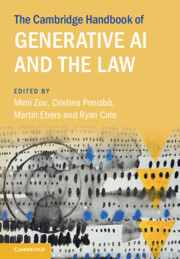Book contents
- Frontmatter
- Contents
- Figures
- Tables
- Contributors
- Foreword
- Preface
- Part I Understanding Generative AI from Multidisciplinary Perspectives
- Part II Evolving Regulatory and Governance Frameworks
- 6 LLMs Meet the AI Act
- 7 Mapping Generative AI Liability Cases in the EU Legal Framework
- 8 Challenges for Foundation Model Liability and Regulatory Regimes
- 9 Navigating China’s Regulatory Approach to Generative AI
- 10 Singapore’s Evolving AI Governance Framework
- 11 Shaping Global AI Governance
- 12 Generative AI and International Standardisation
- 13 Private Ordering and Generative AI
- Part III Generative AI
- Part IV The Use of Generative AI in Legal and Related Sectors
6 - LLMs Meet the AI Act
Who’s the Sorcerer’s Apprentice?
from Part II - Evolving Regulatory and Governance Frameworks
Published online by Cambridge University Press: 08 August 2025
- Frontmatter
- Contents
- Figures
- Tables
- Contributors
- Foreword
- Preface
- Part I Understanding Generative AI from Multidisciplinary Perspectives
- Part II Evolving Regulatory and Governance Frameworks
- 6 LLMs Meet the AI Act
- 7 Mapping Generative AI Liability Cases in the EU Legal Framework
- 8 Challenges for Foundation Model Liability and Regulatory Regimes
- 9 Navigating China’s Regulatory Approach to Generative AI
- 10 Singapore’s Evolving AI Governance Framework
- 11 Shaping Global AI Governance
- 12 Generative AI and International Standardisation
- 13 Private Ordering and Generative AI
- Part III Generative AI
- Part IV The Use of Generative AI in Legal and Related Sectors
Summary
The chapter examines the legal regulation and governance of ‘generative AI,’ ‘foundation AI,’ ‘large language models’ (LLMs), and the ‘general-purpose’ AI models of the AI Act. Attention is drawn to two potential sorcerer’s apprentices, namely, in the spirit of J. W. Goethe’s poem, people who were unable to control a situation they created. Focus is on developers and producers of such technologies, such as LLMs that bring about risks of discrimination and information hazards, malicious uses and environmental harms; furthermore, the analysis dwells on the normative attempt of EU legislators to govern misuses and overuses of LLMs with the AI Act. Scholars, private companies, and organisations have stressed limits of such normative attempts. In addition to issues of competitiveness and legal certainty, bureaucratic burdens and standard development, the threat is the over-frequent revision of the law to tackle advancements of technology. The chapter illustrates this threat since the inception of the AI Act and recommends some ways in which the law has not to be continuously amended to address the challenges of technological innovation.
Keywords
Information
- Type
- Chapter
- Information
- The Cambridge Handbook of Generative AI and the Law , pp. 85 - 98Publisher: Cambridge University PressPrint publication year: 2025
